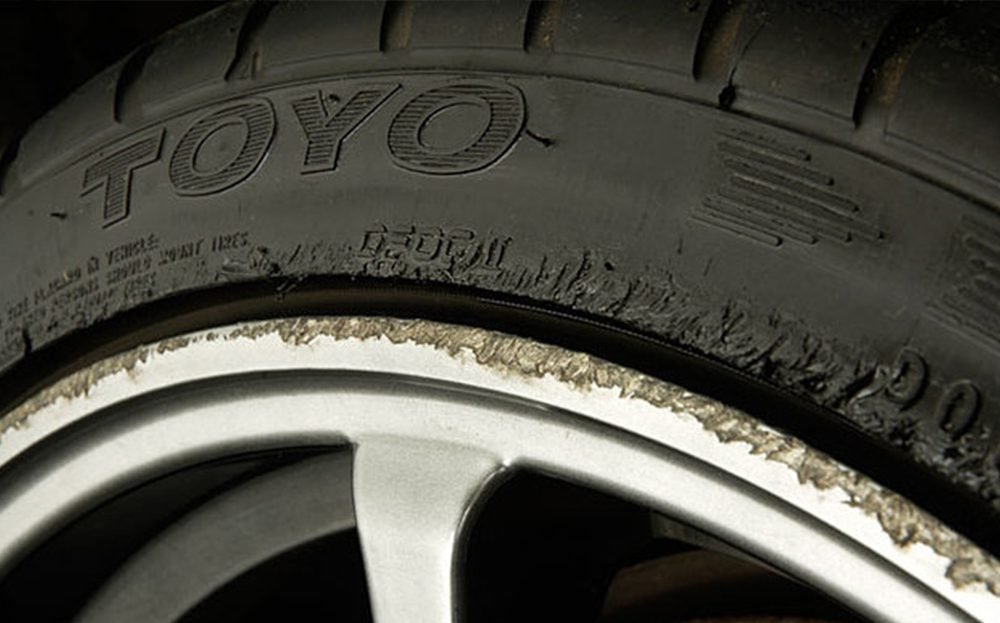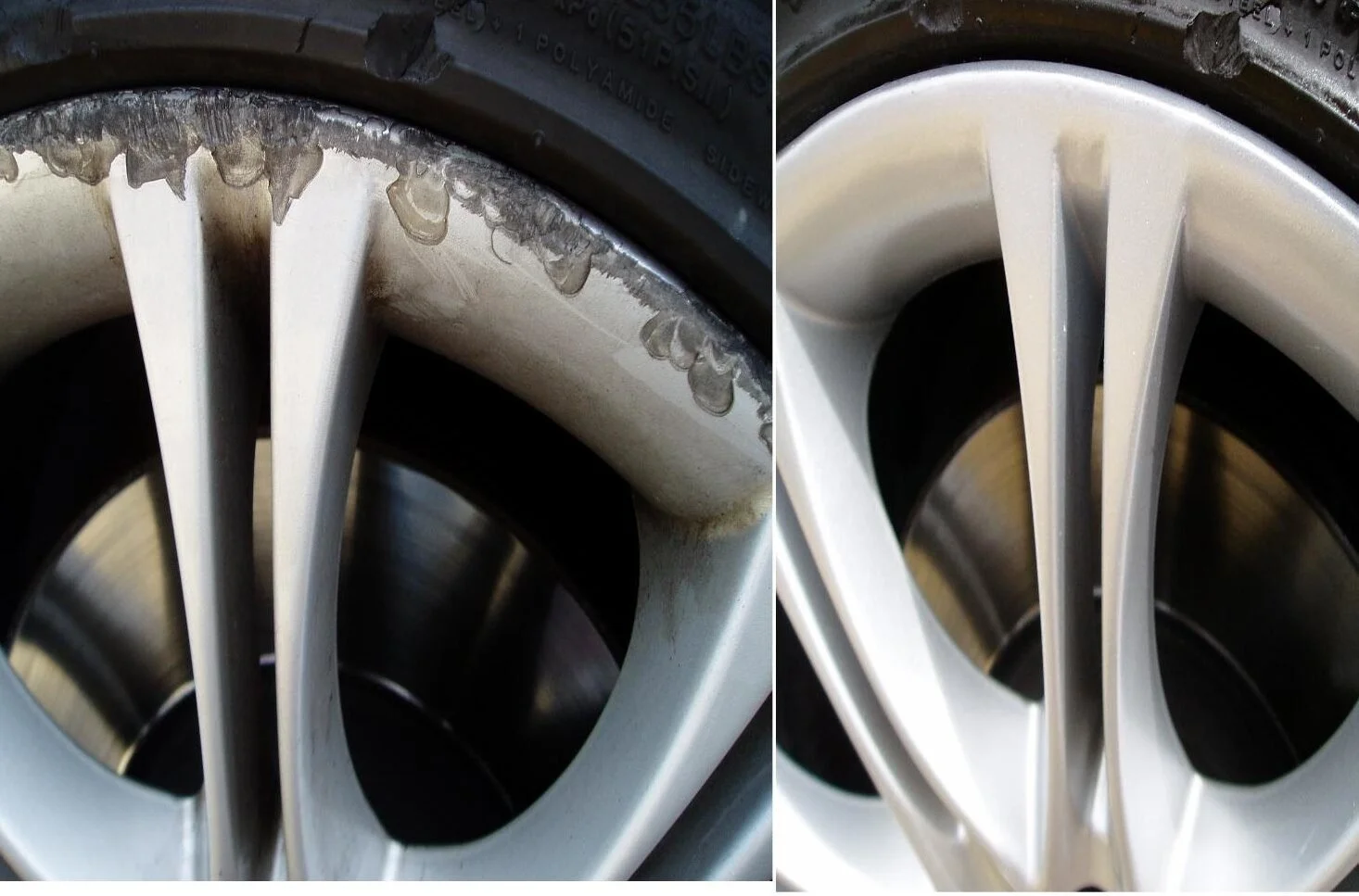Prevention Beats Alloy Wheel Repair
It’s “pothole season” in Madison WI and hitting these craters send drivers to auto body shops for alloy wheel repair every year. Custom wheels and rims are vulnerable to run-ins with potholes, sliding into curbs and getting clipped by a shovel or plow. These incidents do more than cosmetic damage. They can bend rims, break the seal between wheel and tire and dig deep into the wheel’s surface.
Almost every vehicle on the road today rides on chromed or painted alloy wheels. High-tech wheels and rims provide glamor, style and performance. Maintaining their shine and protecting their finish is never more difficult than when salt and ice melting chemicals coat roadways. As if these corrosives aren’t enough, slipping, sliding, damaged pavement and heavy metal plows running too close increase the threat.
Corrosion Leads To Alloy Wheel Repair
Corrosion is the enemy of almost every surface on every vehicle. Since wheels make the closest contact with road salt, debris and busted pavement it stands to reason they’re prime targets, right? Dangerously corroded wheels can fail, especially when slammed into a gapping pothole. In addition, where rust has taken a deep hold wheels can leak air.
Especially when outside temperatures change drastically and metal expands or contracts.Nothing defends your car, SUV or truck from the corrosive impact of road salt better than a good car wash and professional wax.
During “pothole season” clean your ride as often as possible. Take time to knock off sludge and rinse off the salt brine mixture when you can. Salt brine coats everything including the front- and back-sides of your wheels. The more often you wash wheels the better off you are.There are commercially-available sealants that may be applied to prolong protection. Some work better than others, especially in sub-zero temperatures, so experiment.
And, don’t expect miracles. Adding a sealant provides some protection to aluminum, chrome and alloy rims. If they work in winter, it makes sense to use them all year, doesn’t it? They protect rims and wheels from corrosive brake dust, too.Is parking in a nice, warm garage protection enough from winter damage? It’s a great help, of course. But in many cases in a warm garage the moisture from melting snow and ice forms the salt brine that penetrates scratches ad cracks. If clearcoat, paint or base materials are damaged it quickens the corrosion process.
Simple Steps To Avoid Wheel Repair
You have several options for wheels. No matter what you choose, almost all wheels are painted – from custom colors to silver paint.
In addition the surface gets clearcoat protection. The base metal is tough but even so, it doesn’t take much to scratch the surface. An apparently minor scratch invites long-term damage when road salt coats the road.Protecting wheels and rims from dings, dents and scratches is critical. When roads are slick it is way too easy to slide into the curb as you park or hit a barrier in a lot. If you parallel park both front and rear wheels are at risk.Remember, looks can be deceiving. Not all curbs are straight and smooth, especially after getting slammed by plows. Banging into curbs or getting broken chunks of concrete jammed into a wheel is like hitting it with a hammer. Higher curbs are more likely to cause damage than those at a lower angle to the wheel. The watchword is “take care” – watch where you park and watch your speed.Tire inflation is another concern when roads are slippery and temperatures drop.
Properly inflated tires give you the best traction and they protect your rims. A poorly inflated, flatter tire increases chances of rim damage.Damage opens surfaces to corrosion and rust. There’s little you can do to fend off collisions but you can guard against rust. The No. 1 preventive is keeping wheels and rims coated with a generous layer of a high-quality wax. It repels water, including a mix of melted snow and salt or other chemicals. It takes time and attention to details but it at least delays costly repairs on alloy wheels. If you don’t have alloy wheels, you’ll be glad to hear that standard steel wheels are easier and cheaper to repair.
Alloy Wheel Repair Options
Technology has kept pace with automotive advances and auto body professionals are equipped to repair almost any wheel damage. In addition they can protect repaired wheels with a new coat of paint. The majority of wheel repairs are corrosion-related and are corrected with proper attention to surface damage.A trained auto body technician can diagnose the seriousness of any situation and recommend the best remedy. You have several options for repairs, refinishing and repainting. When you catch damage and corrosion early a pro can restore almost any wheel to a like-new finish. Among your wheel repair choices are:
Resurfacing the wheel, removing all traces of corrosion.
Adding a fresh coat of paint.
Applying a protective clearcoat to guard against further oxidation.
High-end treatments include adding a chrome finish after corroded areas have been properly prepped.
Not all refurbishing technique work on every type of wheel. Unfortunately, there are some things you just cannot fix. Among the worst-case scenarios are:
Trying to make chrome wheels appear “like new” – chips in the finish and deep scratches cannot be ground, buffed or polished out of chrome wheels. Chrome plated onto base metal. Once the chrome surface is broken it is not repairable.
Refinishing high-gloss aluminum wheels – to repair it, aluminum must be in its original condition. That means the surface must be smooth and clean. Paint won’t repair high gloss metal.
Alloy Wheel Repair – An AutoColor Specialty
Wheel repairs, paintless dent remedies and restoring vehicle paint, clearcoat and trim is an AutoColor specialty.
Call AutoColor or stop into one of our local auto body shops: on Madison’s West Side in Middleton on Parmenter Road, 831-9554; on Madison’s East Side on Stoughton Road near Buckeye Road, 221-5041 to for a vehicle review or to schedule an appointment.
Put our skilled, experienced professionals to work on your car, truck or SUV when alloy wheel repair is necessary in the Madison WI area.


